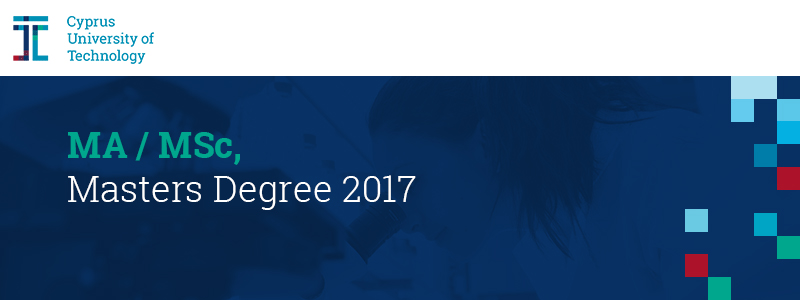
The Cyprus University of Technology has announced new positions for graduate studies. The deadline for applying is will announce soon. Visit this page for mοre information.

The Cyprus University of Technology has announced new positions for graduate studies. The deadline for applying is will announce soon. Visit this page for mοre information.

Designing digital stories on contemporary environmental problems
From 27-30 June 2016, the MCL Research group enacted a four-day workshop which was addressed to primary school children. In particular, a total of 66 primary school children participated in the summer club, and were invited to develop their own digital stories on waste management, employing Scratch Jr. In this way, the Summer Club served as an empowerment activity, for enhancing children’s environmental knowledge and programming skills.
Scratch Jr is a mobile application released in 2014 and was developed by Tufts University, with grants from the NSF. Scratch Jr is based on a simplified version of the Scratch graphical programming language for enabling young children to easily learn programming and create various digital projects such as digital games or interactive stories and animations. Scratch Jr, in contrast to traditional text-based programming languages, employs the building block approach; children as young programmers have the opportunity to develop programming algorithms simply by dragging and dropping colorful building blocks that indicate different commands (e.g. motion commands, triggering commands, sound commands, control commands etc.). The goal of Scratch Jr is to “develop and study the next generation of innovative technologies and curricular materials to support integrated STEM learning in early childhood education” (ScratchJr.org).
Overall, the Summer Club activities were designed to develop children’s knowledge and skills on the follow topics: (a) the use of new technologies (specifically designed for small children) to produce digital stories, (b) the development of creative thinking, (c) raise awareness on environmental issues, and (d) take active citizenship actions on these issues.
During the Summer Club all of the participating students were excited and collaborated in groups of 2-3 for developing their own digital stories. By the end of the project, all of the students expressed that through the activity had the opportunity to learn more about programming and waste management through an amusing and creative way!
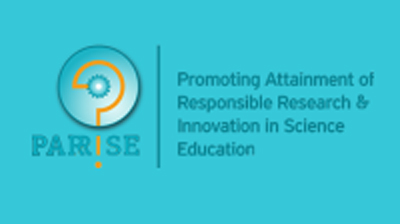
by Eleni A. Kyza, Yiannis Georgiou, Andreas Hadjichambis, Andria Agesilaou
The review of the literature, and our own research-based conclusions from previous professional development projects (PROFILES, CoReflect) all point to the need to engage teachers in extended professional development experiences (Loucks-Horsley, Stiles, Mundry, Love, & Hewson, 2010). Change is slow, especially when dealing with innovative approaches, such as SSIBL, and the desire to bring about reform in actual practice. The PARRISE Cyprus approach sought to not only inform teachers of SSIBL and help them gain a deeper understanding of the SSIBL framework, but wished to go a step further to supporting teachers in designing problem-based SSIBL modules that address all SSIBL pillars, and test them at their schools with their students.
Therefore, we recruited in-service teachers from elementary, lower secondary and upper secondary classrooms, from the disciplines of biology, chemistry and elementary science. Since the TPD took place during the teachers’ own time, and given the multiple demands on teachers’ schedules, we opted for a blended approach to professional development that combined face-to-face (f2f) and online professional development meetings. The approach is shown in Figure 1.
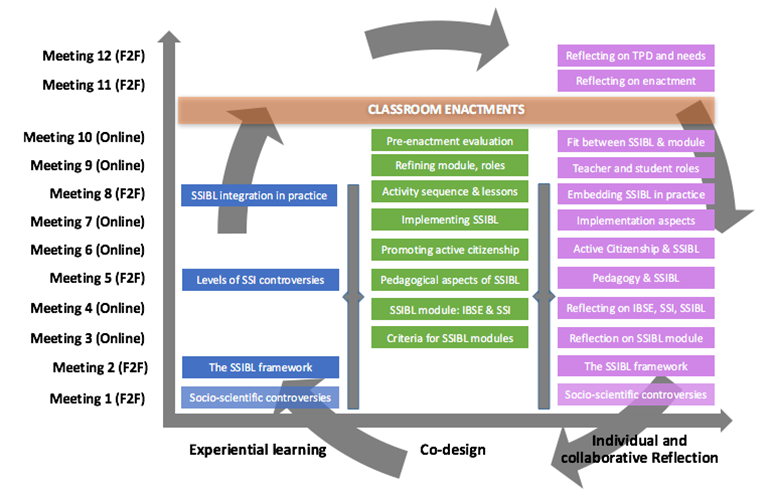
Figure 1
Forty-one teachers participated in the TPD course between October 2015 and June 2016. Teachers formed eight collaborative design (co-design) teams, each led by a teacher educator; in total, there were two biology co-design groups (lower secondary, upper secondary), three chemistry co-design groups (one lower, two upper secondary) and three elementary science co-design groups.
The TPD approach combined experiential learning, occurring during five face-to-face meetings, co-design meetings (most often taking place online during the evenings), and continuous reflection activities. Four main aspects of the TPD served as the main mechanisms for supporting TPD processes: experiential learning, co-design, the opportunity to enact and assess the effectiveness of the SSIBL implementations, and continuous opportunities for reflection. Reflection was a key aspect of the TPD and was fostered through teacher educator scaffolding, peer feedback, feedback between interdisciplinary groups, the co-design process and the opportunity to enact, evaluate and reflect on the SSIBL framework.
The experiential activities were based on a constructivist approach to learning, and engaged teachers in an inductive exploration of the need and meaning of the SSIBL pillars (inquiry-based science education, socio-scientific issues, citizenship education) and how they relate to the grand ideas of Responsible Research and Innovation (RRI). Meeting 1 focused on discussing the nature of science and its role, especially on controversial socio-scientific issues, in addressing societal needs. The teachers were introduced to the idea of Grand Challenges and the need to discuss the role that science education can play. In the main experiential activity, the teachers assumed the role of students and engaged with a problem-solving online learning environment on the use of antibiotics in livestock. Through this situation, teachers were implicitly exposed to issues of socio-scientific controversy and the notion of responsible research, innovation and active citizenship.
The next meeting, which was again a face-to-face meeting, introduced teachers to the SSIBL framework explicitly, but without defining the pillars of IBSE, socio-scientific controversies, citizenship education and how they all contribute to RRI. Rather, teachers were guided to research online, collaborate, discuss and reflect, to make sense of the terms on their own. In addition, Meeting 2 marked the formation of the disciplinary co-design groups, which were asked to identify curriculum areas which could then be modified or extended to integrate the aspects emphasized by the SSIBL framework. These groups collaborated until the end of the course to create and enact these PARRISE modules.
Co-design is an important tenet of situated learning during in-service teacher professional development (Kyza & Georgiou, 2014; Kyza & Nicolaidou, 2016). The co-design groups met online for 90-120 minutes each time on eight occasions between November 2015 and March 2016. These meetings supported the co-design, which was also strengthened by email communication and the two face-to-face meetings (Meeting 5 and Meeting 8). The classroom enactments (implementations) offered the unparalleled opportunity of testing out and refining SSIBL ideas, as the teachers’ reflection on the enactments indicated. Based again on our prior experience, we believe that enactments offer invaluable opportunities for situated learning (Kyza & Nicolaidou, 2016).
Figure 2 highlights the iterative and cyclical nature of the Cyprus TPD model, while also emphasizing that through these four aspects of the TPD teachers rotated through all four roles of teachers as: learners, designers,innovators, and reflective practitioners.
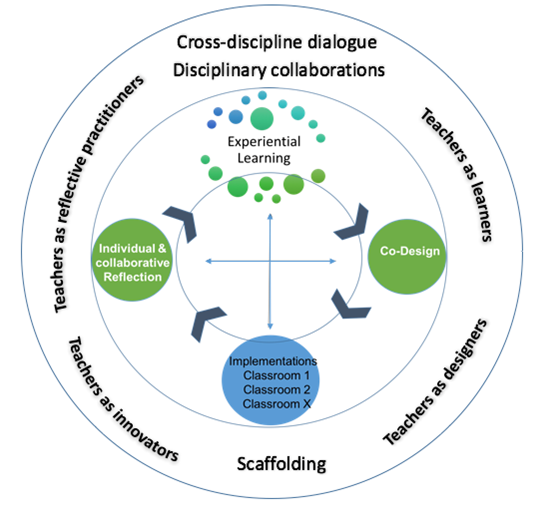
Figure 2
Each of the teacher teams co-designed a learning environment which was then implemented in different schools across Cyprus by the co-design team members. These eight SSIBL modules were enacted in 25 schools and 28 classrooms; they were taught by 26 teachers and 476 students who participated in these enactments. Preliminary analyses indicate positive results in terms of students’ perceptions of active citizenship and motivation to engage with SSIBL and PARRISE ideas. More analyses are underway and will be shared soon with the PARRISE community.
References
Kyza, E. A. & Georgiou, Y.(2014). Developing in-service science teachers’ ownership of the PROFILES pedagogical framework through a technology-supported participatory design approach to professional development. Science Education International, 25(2), 55-77.
Kyza, E. A., & Nicolaidou, I. (2016). Co-designing reform-based online inquiry learning environments as a situated approach to teachers’ professional development. CoDesign, 1-26. doi:10.1080/15710882.2016.1209528
Loucks-Horsley, S., Stiles, K. E., Mundry, S., Love, N., & Hewson, P. W. (2010). Designing professional development for teachers of science and mathematics (3rd ed.). Thousand Oaks, CA: Corwin

RRI and Active Citizenship through teaching science in the context of the PARRISE European project
by Eleni A. Kyza, Yiannis Georgiou, Andria Agesilaou & Andreas Hadjichambis
The 1st round of the PARRISE Cyprus TPD program was completed with a national conference entitled “RRI and Active Citizenship through teaching science in the context of the PARRISE European project”. The conference took place at the Cyprus University of Technology on June 11th, 2016, from 8.30-13.30. The aim of the conference was to give the opportunity to the different science education stakeholders in Cyprus (e.g. policy-makers, academics, school administrators, science education teachers, parents and students), to learn about the PARRISE project and its philosophy, focusing on the PARRISE Cyprus teacher network activities in 2015-2016, and to participate in a public discussion about Science Education in Cyprus.
A total of 90 stakeholders responded positively to our invitation and attended the 1st national PARRISE conference at Cyprus. The conference started with a greeting from Dr. Eleni A. Kyza, coordinator of the PARRISE Cyprus project, a greeting from Dr. Demetrios Mappouras, Inspector of Biology at the Cyprus Ministry of Education and Culture, and a greeting from Mrs. Chrystalla Koukouma, Inspector of Chemistry at the Cyprus Ministry of Education and Culture.
Next, Dr. Kyza, gave an introductory speech presenting the PARRISE Cyprus project. During her presentation, Dr. Kyza highlighted the goals and philosophy of the PARRISE project, introduced the Socio-scientific Inquiry-based Learning (SSIBL) framework and presented the main actions which were realized during the PARRISE 2015-16 TPD courses.
After that, the local PARRISE 2015-16 teachers presented the SSIBL modules they had developed and implemented, while also sharing their views on this process.
As one teacher participant stated:
“Designing our SSIBL module was real fun. Employing a participatory design process allowed us to interact with other colleagues, to exchange our views and ideas, and to collaborate on developing innovative teaching material for our students.”
Another teacher commented afterwards:
“It was a really interesting experience, as we also had the opportunity to implement the SSIBL module within our science classrooms. This allowed us to integrate the SSIBL framework into our teaching practice.”
In addition, 16 posters, prepared by the participating students and teachers, were posted outside the auditorium throughout the event allowing attendees to learn more about the classroom implementations and giving the opportunity to PARRISE teachers and students to present their work to everyone during the breaks.
As reported during the poster session by one student:
“With our participation in the PARRISE project we have learned how to act as future citizens. In particular, we learned to be active citizens and to look out for the most sustainable solutions.”
On the same note, according to another student:
“The topic we have investigated was very interesting. We have realized that as responsible citizens it is important to shape our personal views about the different socio-scientific controversies, so that we can create a better future for us and for the future generations.”
The programme continued with a presentation by Mr. Yiannis Georgiou, Research Associate of PARRISE Cyprus; the presentation focused on the evaluation of the SSIBL implementations. During the presentation, Mr. Georgiou highlighted the effectiveness of the SSIBL-based implementations in terms of promoting students’ motivation, scientific thinking and active citizenship.
The conference concluded with a discussion about the goals of science education in Cyprus, including the main problems and challenges encountered in the local educational system.
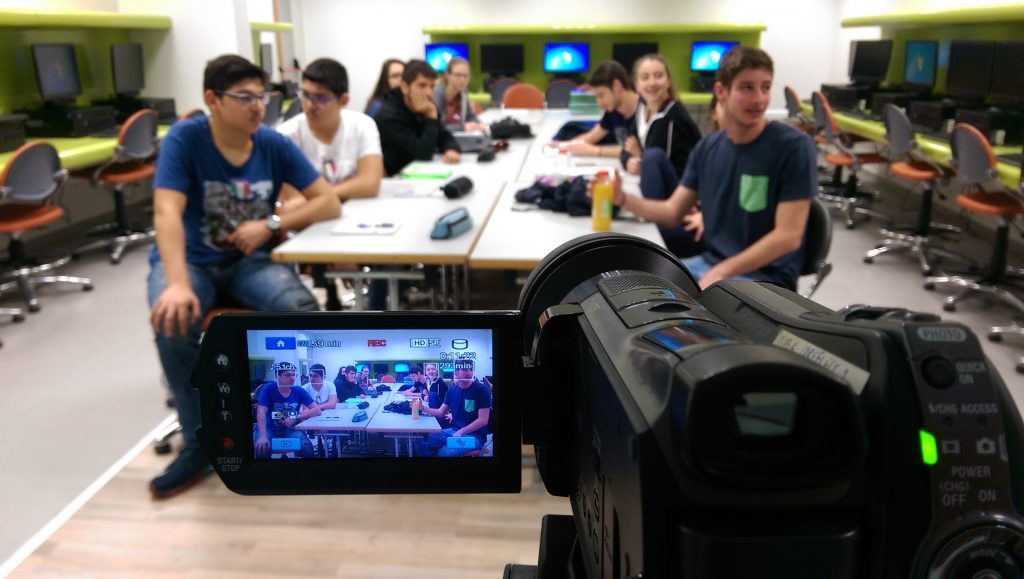
The “App inventors” experience: Empowering students to change their community through blocks-based visual programming
During the Spring semester of 2016, the MCL Research Group enacted the “App Inventors” program with a total of 18th graders from Laniteio A’ Lyceum.
The program aimed to enhance students’ awareness of contemporary socio-scientific issues and help them develop computational thinking skills. As part of the program, students were divided in pairs; each pair employed the App Inventor web-based app.
The App Inventor web-based application was developed by Google’s Mark Friedman and MIT Professor Hal Abelson. The App Inventor transforms programming from complex language of text-based coding into visual, drag-and-drop building blocks. Tools such as MIT’s App Inventor (Abelson, 2009), a visual programming language with “low threshold, high ceiling” potential, seek to demystify computers and empower, by allowing users to easily design and run their own mobile apps.
The program aimed to help students learn how to program and develop mobile applications to investigate socio-scientific issues. In particular, during the program, the students participated in a sequence of experiential activities, aiming to develop their knowledge and skills on the follow topics: (a) the use of new technologies to produce digital stories or interactive digital games through programming, (b) the development of creative thinking, (c) raise awareness on contemporary socio-scientific issues, and (d) take active citizenship actions on these issue.
Overall, these activities enabled the students to develop simple apps and check their functionality on their mobile phones or on tablets supplied by our research group. Once familiarized with the app creation software (AppInventor), students worked in groups to develop their own apps focusing on a variety of socio-scientific issues, such as waste management or food conservatives.
The program takes place simultaneously in schools in Germany and USA, in cooperation with the Saarland University (Germany) and the Penn Graduate School of Education (USA).

Master Programs
The Cyprus University of Technology has announced new positions for graduate studies. The deadline for applying is will announce soon. Visit this page for more information (in Greek).

by Eleni Kyza, Yiannis Georgiou, Andreas Hadjichambis, & Andria Agesilaou
Our first TPD program began on October 24, 2015 with a group of 48 in-service science teachers (biologists, chemists, primary education science teachers) and will run until May 2016. The TPD adopts a model of teachers as learners, designers and reflective practitioners. Teachers work in eight different design groups, organized according to discipline and level of teaching (primary, lower secondary or upper secondary education). The TPD is composed of five face-to-face meetings, each one lasting six hours, and bi-weekly video-conferences of each design team to coordinate the design of the SSIBL modules.

Figure 1: Screenshot from the “Meat safety” learning environment
The main goal of the face-to-face meetings is to familiarize science teachers with the underlying philosophy and the operationalization of the SSIBL framework. Each f2f meeting consists of several experiential activities. For instance, during the first and second face-to-face meeting, our science teachers took on the role of students and investigated the controversial topic of antibiotics in meat, using an online learning environment designed by the local PARRISE team. The “Meat safety” learning environment (see Figure 1) encompassed all four aspects of the SSIBL framework (scientific inquiry, socio-scientific issues, active citizenship leading to responsible research and innovation). The science teachers, working in groups, were assigned one of the stakeholder roles involved in this controversy (e.g. concerned scientists, farmers, medical industry, government agencies, public interest organizations against antibiotics). They were then asked to develop an argument that would answer the driving question (“Should antibiotics in livestock be banned?”) according to the stakeholder’s role they had adopted. Arguments were captured in google docs, to facilitate group work and sharing. At the end of this activity teachers reconvened as a plenary and each group participated in a public debate around the topic (see Figure 2).

Figure 2: Teachers reconvened as a plenary and participated in a public debate about the controversy
Following this activity, in which teachers became the learners, the teachers were asked to work as reflective practitioners, and analyze the learning module and its potential to promote the four dimensions of the SSIBL pedagogy.
The next face-to-face meetings included brief introductions of each of the SSIBL dimension, along with experiential activities to foster a grounded understanding of the SSIBL framework. Each meeting also included time for teachers to work in their design teams. This type of TPD experiences, structured around exemplary SSIBL material, and including a variety of presentations, discussions, experiential activities and design time allows teachers to conceptualize the SSIBL pedagogical framework, while also affording opportunities to elaborate and operationalize its main dimensions. In this context, the face-to-face meetings are purported to function as a mechanism for our web-based meetings during which the PARRISE teachers work collaboratively to design SSIBL-based activities for their science students.

A report by the organisers.
The 16th Biennial conference of the European Association for Research on Learning and Instruction and the 19th JURE conference took place at the coastal city of Limassol between August 23-August 29, 2015, and were hosted by the Cyprus University of Technology. The conferences were co-organized by the Department of Communication and Internet Studies at the Cyprus University of Technology and by the EARLI association. The organization of the EARLI 2015 conference coincided with the celebration of the 30th anniversary of the EARLI, which first took place in Leuven, Belgium in June 1985 and the 20th anniversary celebration of the JURE conference.
The theme of this year’s conference was “Towards a Reflective Society: Synergies between Learning, Teaching and Research”. Reflective citizenship lies at the heart of contemporary societies. The 21st century calls for a re-definition of the forms of knowledge, skills and competences that are necessary for the advancement of our societies. While the focus on basic skills and the need for disciplinary knowledge cannot be ignored, there is a need to work towards increasing the reflective capacity of our societies. The EARLI 2015 theme emphasized research-based learning and instruction and highlighted the crucial role of the systematic investigation of learning and teaching as a mechanism for promoting innovative and creative thinking and sustaining long-term societal growth.
As with every EARLI conference, the preparations begun right after the end of the EARLI 2013 conference in Munich and spanned over two years. Many members of the EARLI community were involved in this process, as, in addition to the conference organizing committee, the organization was also steered by the International Programme Planning Committee and Scientific Panel, the EARLI Executive Committee, and included input from the SIG coordinators, especially in involving reviewers and in deciding the invited keynote speakers. The review process involved over 370 reviewers and the final scientific programme included more than 3000 unique contributors (authors or co-authors) from 48 countries. The programme was impressive in its cover of a wide variety of research, cultural contexts and methodological traditions.
We next present a highlight of the scientific and social events of the conference.
The JURE 2015 pre-conference
The EARLI organization attaches great importance on the development of young researchers. Between the 23rd and 24th of August 2015, the JURE (Junior Researchers of EARLI) pre-conference took place. The JURE 2015 conference, which was co-chaired by Dr. Maria Solomou, special scientist at the Department of Communication and Internet Studies, and Mr. Yiannis Georgiou, a Ph.D. candidate at the Department of Communication and Internet Studies, attracted more than 300 people from all over the world. A total of 157 submissions were presented at the JURE conference (paper presentations, poster presentations and round tables), while 15 workshops were given by established researchers from the field of learning and instruction.
The EARLI 2015 opening ceremony
The conference opening ceremony on Tuesday, August 25, attracted many EARLI 2015 delegates who enjoyed the traditional dance performance by the Limassol Folklore Association and were treated to Cypriot traditional sweets. Eleni A. Kyza (Conference President) and Iolie Nicolaidou (Conference Manager) welcomed the EARLI attendees and provided an overview of the schedule and events for the EARLI conference. Professor Toula Onoufriou, Vice Rector of Academic Affairs at the Cyprus University of Technology, welcomed everyone on behalf of the University.
A rich scientific programme
The conference was well attended by 1800 researchers and had the invaluable contribution of more than 125 volunteers from all over Cyprus. Each one of the five days of the conference consisted of 21-30 parallel sessions with an average number of four presentations in each session. In total, over 1500 contributions were presented in different formats (symposia, paper presentations, poster presentations, ICT demonstrations, workshops, round tables and keynote speeches). The presentations were grouped in 47 scheduling categories based on the various research areas of EARLI.
Invited Keynotes
During the three of the five days of the conference, three parallel keynote speeches were held by nine well-known academic keynote speakers (Prof. Clark Chinn, Rutgers University, USA, Prof. Andreas Demetriou, University of Nicosia, Cyprus, Prof. Yrjö Engeström, University of Helsinki, Finland, Prof. Tina Hascher, University of Bern, Switzerland, Prof. Christine Howe, University of Cambridge, U.K., Prof. Leonidas Kyriakides, University of Cyprus, Cyprus, Prof. Marcia Linn, University of California Berkeley, USA, Prof. Jane Oakhill, University of Sussex, U.K., and Dr. Anna Südkamp, Technical University Dortmund, Germany). All presentations are available at the EARLI 2015 YouTube channel.
Presidential Address and the recipients of the EARLI 2015 Awards
On the evening of the first day of the conference the President of EARLI (2013-2015) Professor Costas P. Constantinou (University of Cyprus) presented an inspiring speech at the lovely open-air municipal theatre.
The event continued with the presentation of the EARLI 2015 awards. The Erik De Corte Award, which recognizes young, promising scholars in the field of Learning and Instruction was presented to Dr. Bjorn de Koning, from VU University, The Netherlands. The Outstanding Publication Award was presented to Dr. Cornelis J. de Brabander (Leiden University, Netherlands) and Professor Dr. Rob L. Martens (Welten Institute, Open University of the Netherlands) for their paper “Towards a unified theory of task-specific motivation”, which was published in Educational Research Review. The Oeuvre Award, which recognizes lifetime, outstanding contribution to scholarship and research was presented to Professor Dr. Monique Boekarts, from the University of Leiden, The Netherlands. Congratulations to all!
The end of Presidential Address and Awards included two special citations for two members of the EARLI community who have contributed a considerable amount of their personal and professional time in the last decades to the service of the EARLI association. The special citations went to Filip Dochy, who is stepping down as EARLI Managing Director after 10 years, and Costas P. Constantinou, who is stepping down from EARLI president and EC member. Warm thanks went to both of them for their continuous efforts to strengthen the EARLI association.
The event concluded with a spectacular reception at the gardens of the Patticheion Municipal Museum Gardens, accompanied by the sounds of jazz music.
Social events
The EARLI 2015 conference programme included many social events, which gave the participants the opportunity to interact in a more relaxed setting. These events included the “Lunch with the Professors”, the “Doctoral Consortium Lunch”, the SIG dinners on Wednesday evening and the spectacular Gala dinner by the St. Raphael resort marina. The gala dinner attracted 600 delegates who enjoyed cypriot and international cuisine and danced to local and international music.
Closing ceremony
The conference continued until Saturday afternoon. The well-attended closing ceremony included the announcement of the EARLI 2017 conference and the passing of the EARLI baton from the EARLI 2015 conference president to the EARLI 2017 conference president, Professor Eero Ropo, who presented the site of EARLI 2017, Tampere, Finland.
Thank you!
In 2015 the EARLI organization celebrates 30 years since its founding. The Cyprus University of Technology was proud to host the conference at such a historic, for the EARLI association, time. Everyone in the center of Limassol have felt the pulse of the conference, as delegates circulated daily from the area of the medieval castle to the Rialto theatre. The organizing committee of the conference would like to thank the Rector and the vice-Rectors of the university, the university officials and all the administrative staff and volunteers who participated and supported the conference. Special thanks are due to all organizing committee members who have worked with tremendous dedication for the success of such an international scientific conference.
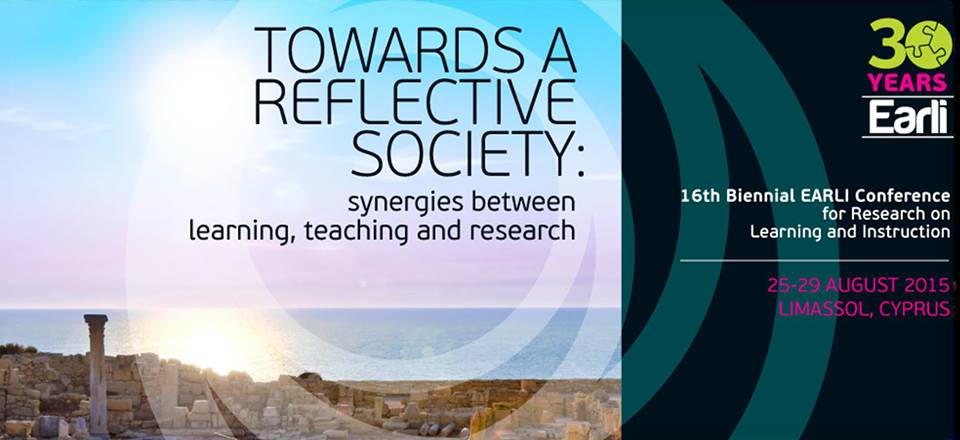
25-29 August 2015
The European Association for Research in Learning and Instruction (EARLI) conference is one of the largest and most important educational research conferences at European level and worldwide. It is an excellent opportunity to be updated on research about learning and teaching approaches related to educational and other learning environments.
The 16th Biennial Conference of the will take place in Limassol, Cyprus at the Cyprus University of Technology (CUT) from the 25th to the 29th of August 2015.
The theme of the EARLI 2015 conference is “Towards a Reflective Society: Synergies between Learning, Teaching and Research”. The EARLI 2015 theme addresses the emphases of the conference on research-based learning and instruction, while highlighting the crucial role of the systematic investigation of learning and teaching as a mechanism for promoting innovative and creative thinking and sustaining long-term societal growth.
Reflective citizenship lies at the heart of contemporary societies. The 21st century calls for a redefinition of the forms of knowledge, skills and competences that are necessary for the advancement of our societies. While the focus on basic skills and the need for disciplinary knowledge cannot be ignored, there is a need to work individually and collectively towards increasing the reflective capacity of our societies. This means that different stakeholders, such as learners of different ages and stages, teachers at all levels, and researchers need to focus on being reflective in their practices and need to synchronize efforts, so that we can all reach the ambitious goal for education as an integral and productive force of an innovative modern society
For more information please visit the EARLI 2015 website.